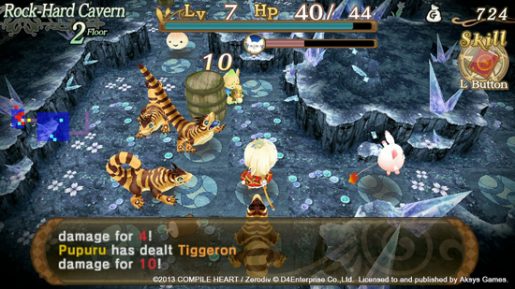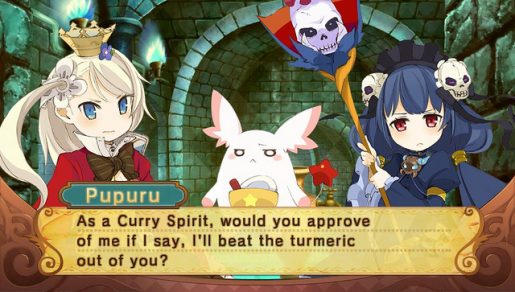Combat is back to the same plodding turn based system that the genre is known for, but don’t let that sound like the game’s slow paced at all. There’s a nice curve of difficulty when you first start the game (or any subsequent death) that’s quickly matched by character growth. Instead of retaining all of your powers upon starting another dungeon, you’re returned to level 1 with any items you decide to keep upon your character and any skills/spells learned by tomes. There’s little reason to keep more than a basic weapon and shield, a Transport Tome to return back to town if things get hairy, and maybe ONE healing potion. Beyond that, everything else will easily be scavenged along the way. So much so that you’ll be constantly swapping out gear and throwing the excess to Kuu to power your companion up or bringing the remainder back to town to sell for a few coin. If you find a weapon that you particularly enjoy, there’s no reason not to keep a hold of that along your entire adventure (that is, unless you lose all of your HP and get sent back to town without any of your stuff).
There’s a mild equipment upgrade system that’s far more streamlined than what I’ve come to expect from a role playing game. Two items of a given type can be combined (sword, staff, and shield), giving the first piece of equipment used a statistical boost (+1, +2, etc) and transferring any abilities from the second piece of gear to make a much more powerful piece of equipment. The more you use a given piece of equipment, the more ability slots they will hold. If you’re tenacious enough, it’s not difficult at all to make a piece of gear that can take you through most of the dungeons with minimal effort, rendering most of the challenge to Sorcery Saga moot.
Sorcery Saga is a relatively short affair on the Vita, with only a handful of randomized dungeons to explore. To help give the player more incentive to keep playing, there is an extra side-quest system that’s unlocked midway through the game. Some quest objectives are unlocked simply by playing the game but others require a bit of grinding, such as beating a particular dungeon fifteen times to unlock a costume item. There’s also a series of comedy skits involving the cast but these take a little more effort to unlock. Hidden in white chests throughout the various dungeons are key items like white crayons that can be returned to the library in exchange for a skit. Finding these key items are all too random, so expect the quest to fill out the skit list to take a fair bit of time if you’re aiming for a 100% completion.
While shorter and easier than other roguelikes, Sorcery Saga: Curse of the Great Curry God isn’t without its merits. There’s a fair bit of character and inspiration hidden into every aspect of the game. This was one of those RPGs that I found impossible to put down, instead trying to go a little bit deeper to find more loot and another ingredient for that Legendary Magic Curry.
[Editor’s Note: Sorcery Saga: Curse of the Great Curry God was reviewed on the PS Vita System. Review code was provided to us by the publisher.]




Ryumoau
December 16, 2013 at 3:30 PMI’ll wait for a price drop before i get this.
James
December 17, 2013 at 10:50 PMHow many chapters in the game? Great review btw!